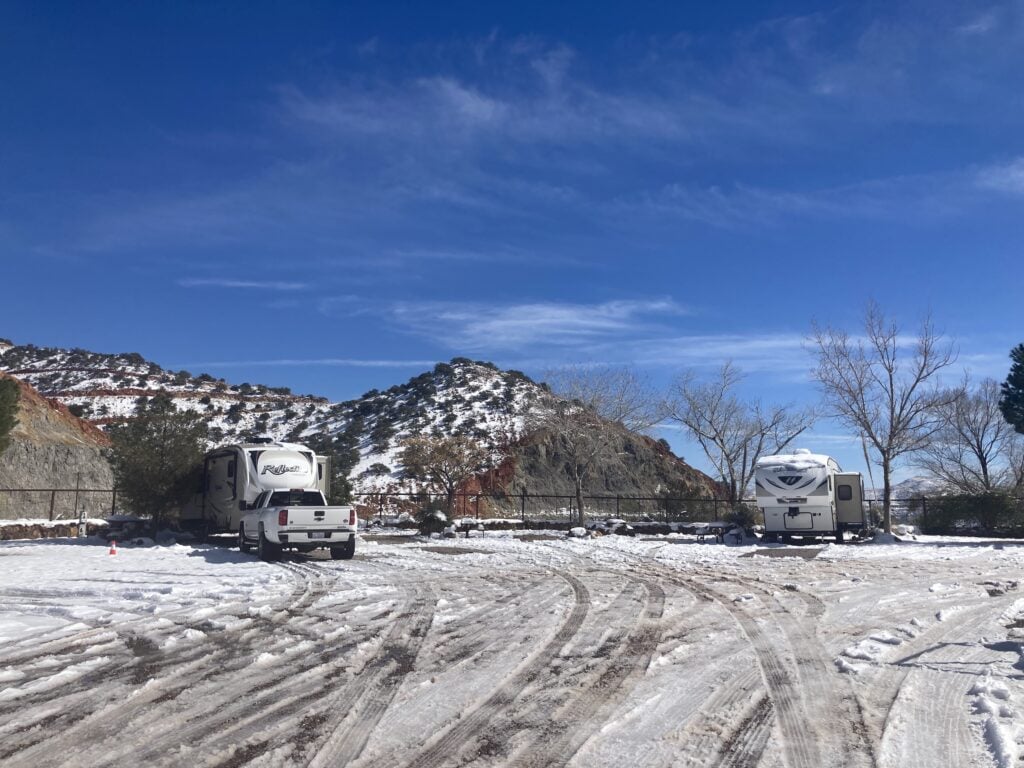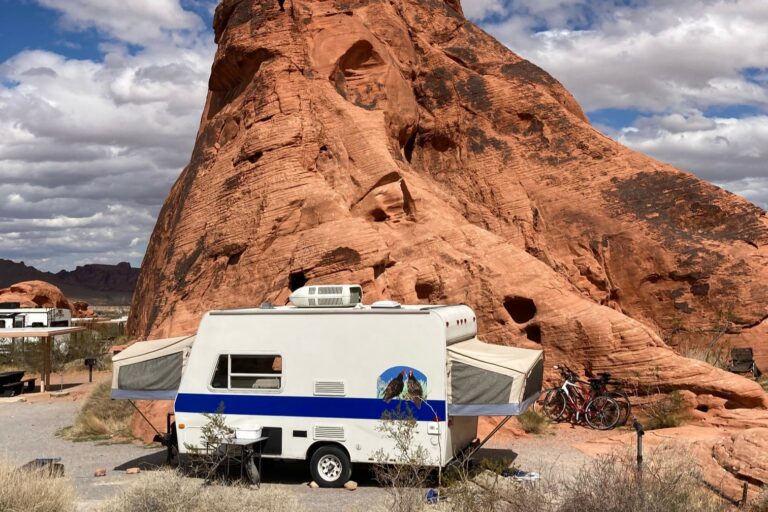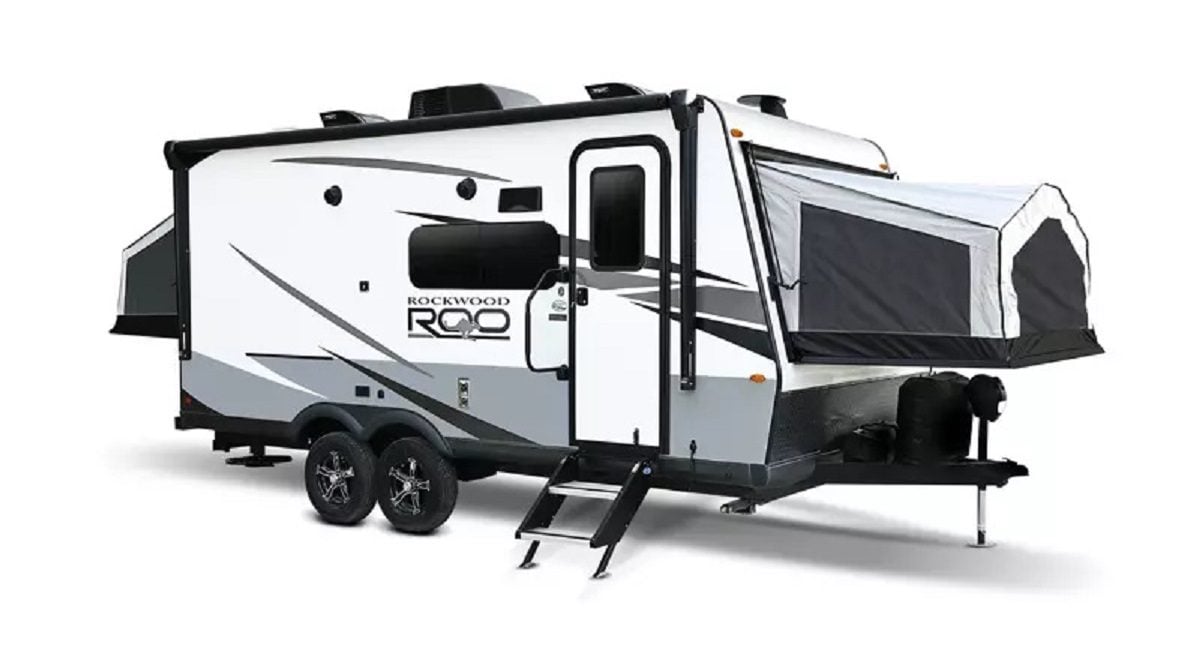This post may contain affiliate links. See our affiliate disclaimer here.
When it comes to choosing the right kind of RV, the options can be overwhelming. Today, let’s talk about a popular choice for camping families: the hybrid camper.
Hybrid campers, a fusion of traditional hard-sided campers and pop-up campers, bring together the best of both worlds. But like any RV type, they come with their own set of pros and cons. Let’s dive in and explore the pros and cons of hybrid campers in detail.
Contents
What is a Hybrid Camper?
A hybrid camper is an innovative blend of a conventional travel trailer and a pop-up camper. It typically features hard-sided main body construction (like a traditional travel trailer) with one or more fold-out sections, usually where the beds are located.
This unique design allows hybrid campers to offer more space and amenities than a pop-up camper, while still maintaining a compact size that’s easy to tow.
An example of a hybrid camper is the Rockwood Roo by Forest River.
Pros of Hybrid Campers

Small and Lightweight
One of the biggest advantages of a hybrid camper is its compact size and lightweight nature. This makes them a great option for those who have smaller tow vehicles or are new to towing trailers. Their light weight also contributes to better fuel efficiency, making your road trips more economical.
Affordable
Hybrid campers are generally more affordable than their full-sized counterparts. This affordability makes them an excellent choice for first-time RVers or those on a tighter budget who still want the comfort and convenience of a hard-sided camper.
Plenty of Sleeping Space
Despite their compact size, hybrid campers are surprisingly spacious when it comes to sleeping areas. The fold-out sections typically house large beds, comfortably accommodating a family of four or more.
This design also maximizes the living space in the center of the camper, providing room for other amenities, such as a full dry bathroom.
Easier Set-Up
Compared to traditional pop-up campers, hybrids are relatively easier to set up. The fold-out sections usually require less effort to deploy, allowing you to settle into your campsite quicker and start enjoying your adventure.
More Amenities Than a Pop-Up
Hybrid campers often come equipped with more amenities than a standard pop-up camper. This includes features like a fully-equipped kitchen, dry bathroom and sometimes even air conditioning and heating systems, making your camping experience more comfortable and convenient.
View of the Stars
One of the more romantic and unique features of a hybrid camper is the ability to sleep under the stars. The fold-out sections often have screened areas that allow you to gaze at the night sky while comfortably tucked in bed, a feature that’s particularly enchanting in scenic locales.
Cons of Hybrid Campers

Not Four Season
Hybrid campers are generally not designed for all four seasons, particularly harsh winters. The fold-out sections are not as well insulated as the hard-sided parts of the camper, making them less suitable for cold weather camping.
Less Security
The canvas or fabric sides of the fold-out sections can be a concern when it comes to security. They are not as secure as the hard sides of a traditional RV, which can be a worry for some travelers.
This is especially concerning when camping in areas with bears or other large predators. A bear can easily claw their way through the canvas walls to get to your food.
Less Privacy
Similarly, the canvas sides offer less privacy than hard walls. Sounds can travel more easily through these materials, which might be a concern in crowded campgrounds or less secluded areas.
Not Soundproof
Along with reduced privacy, hybrid campers are not soundproof. External noises such as wildlife, weather, or nearby campers can be more intrusive compared to a traditional hard-sided camper.
Prone to Leaks
Lastly, the fold-out sections of hybrid campers can be prone to leaks, especially if not properly maintained. Regular checks and upkeep are essential to prevent water damage, which can be a hassle for some RVers.
Hybrid campers offer a unique camping experience, blending the ease and comfort of a traditional travel trailer with the adventure and closeness to nature of a pop-up camper. They are an excellent choice for those looking for an affordable, lightweight, and space-efficient RV.
However, it’s important to consider the limitations regarding seasonal use, security, privacy, noise, and maintenance. As with any RV choice, weighing these pros and cons against your personal camping style and preferences is key to making the best decision for your adventures on the road.
If you don’t think a hybrid camper is right for you, check out our lists of the best pop-up campers and the best lightweight traditional travel trailers.
Happy camping!

Christina Pate is a seasoned full-time RVer who, along with her husband Justin, has journeyed across the US, Canada, and Mexico. Drawing from her extensive travels, RV repairs and RV renovations, she founded Travels with Ted to guide and inspire fellow RV enthusiasts. Christina is also the co-author of The Owner’s Guide to RV Maintenance and the creator of My RV Log Book.


